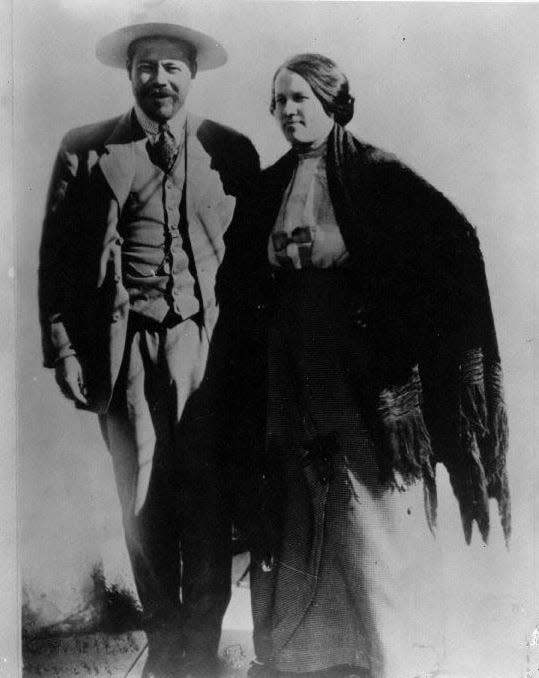Find out how Mexican and Texas histories meshed
Dear Texas history buffs,
I can't claim to know a great deal about Texas history without knowing more about overlapping Mexican history.
This week's column tries to make amends on a very small scale.
I review three new books, "Bad Mexicans," "War on the Border" and "Conquistadores."

All three have earned places of honor on my Texas history shelves.
Here are some past columns about top Texas books:
Texas history: On second thought, make that 60 essential books about our state
Texas History: Pick up these prime books about our Lone Star State
A collection as big as Texas: 6,000+ books about state added to San Marcos Public Library
San Angelo's Cactus Book Shop: Top seller of Texana and Western Americana books
Never stop reading.
Please send tips about Texas memory pages to mbarnes@statesman.com.
Miss a column? Go to our column archives.
Miss a newsletter? Go to our newsletter archives.
Sign up: To get the free Think, Texas weekly digital newsletter, go to the American-Statesman newsletter page, or that of your hometown USA Today newspaper in Texas.
THE COLUMN
Three absorbing new histories link Texas more closely to Mexico
Mexican history is Texas history.
The two subjects are so closely intertwined that it is often hard to see where one ends and the other begins.
Consider our shared 1,254-mile border, which, no matter what people tell you, has always been porous. The historical, cultural and social contact across the Rio Grande has been continuous — sometimes tragic, sometimes joyous — since long before the Spanish arrived in the 1500s.
To this day, almost anything that happens in Mexico affects what happens Texas.
My hold on Mexican history, however, is disgracefully tenuous.
This gloomy state of affairs was brightened recently by three new books and a new friend.
I have known historian Karl Schmitt for just a few weeks, but I already consider him a friend-in-the-making. The Austinite, who turned 100 in July, taught Latin American government at the University of Texas for 30 years, which automatically helps illuminate my historical blind spots.
Currently, I'm working on a newspaper profile about Schmitt's crowded century of living, including his World War II memoirs; he was awarded two Purple Hearts during his European tour of duty.
With an unfailing sense of humor — and more vim and vip at 100 than I can maintain at 67 — Schmitt has helped to push me gently deeper into Mexican history.
Let's not forget that he was born just two years after the end of the Mexican Revolution (1910-1920).
Despite the imbalance in our expertise, I introduced a term — "magonistas" — to him.
I borrowed it from the fantastic new book, "Bad Mexicans: Race, Empire and Revolution in the Borderlands" (Norton) by Kelly Lytle Hernández. It refers to the followers of Ricardo Flores Magón, an ardent anarchist who helped spark the Mexican Revolution, and for many years wrote fiery newspaper articles from this side of the border, including bases in Texas.
Hernández's absorbing story complements two other recent reads: "Conquistadores: A New History of Spanish Discovery and Conquest" (Viking) by Fernando Cervantes, and "War on the Border: Villa, Pershing, the Texas Rangers and an American Invasion" (Simon and Schuster) by Jeff Guinn.
The fact that three publishers of popular books would bring out such serious yet engrossing books about Mexican history in such a short period of time tells me that other readers hunger for this material as well.
It's also encouraging, too, that one book came from an acclaimed American scholar and MacArthur "Genius Grant" recipient; another from a Mexican academic with a deep background in the fields of faith, philosophy and geopolitics; and the third from a Texas author of bestselling books who has shown a knack for covering action and crime.
I can't do these books sufficient justice in a single column, but they are now permanent residents on my Texas bookshelves. I'm sure that they will serve for historical background again and again.
THE PODCAST
On the latest episode of "Austin Found" podcast, J.B. Hager and I remember Jackie McGee, the first woman to serve as principal of an urban public high school in Texas.

HOMETOWN HISTORY
This week's Hometown History theme is Mexican and Mexican American history
· From Abilene: Protest celebrates 50 years as Chicano student walkout hits 50th anniversary
· From Amarillo: The Rev. Jacinto Alderete has devoted his life to his community
· From Austin: How Austin's Mexican Americans fought to make Parque Zaragoza 'heartbeat' of community
· From Corpus Christi: This is why Texas celebrates Diez y Seis de Septiembre
· From Lubbock: Aztlan Park and "Mexican Town"
· From San Angelo: How to celebrate the Mexican holidays of Fiestas Patrias
· From Wichita Falls: Calle Ocho a festival of shared culture
FUN TEXAS FACT
Town opens with a barbecue
On Aug. 26, 1892, the town of Runningwater, in Hale County, officially opened with a barbecue for area residents.
An earlier settlement at the site was named Wadsworth until the post office, established in December 1890, was renamed Runningwater to draw attention to the presence of flowing water. A rural school was also established that year.
The founder of the community and its first postmaster was a railroad land speculator, Dennis Rice. C. C. Slaughter was among the town's early promoters. Rice planned to build a cheese factory in Runningwater but eventually gave up the idea when a leading promoter moved away.
A sustained drought and a grasshopper invasion hindered settlement in the mid-1890s, but passage of the Four-Section Act in 1895 brought new settlers into the area. However, the Fort Worth and Denver Railway missed the community by three miles when the tracks were laid in 1928. The post office was moved to Edmonson Switch on the railroad in 1937 and Runningwater was largely abandoned.
(Texas Day by Day / Texas State Historical Association) READ MORE
TEXAS TITLES
I recommend: "Texas Dives: Enduring Neighborhood Bars of the Lone Star State" by Anthony Head with photographs by Kirk Weddle
This book had to happen. That we did not already have a trusted compendium of Texas dives kind of shocked me when this brand new book from Texas A&M University Press landed on my desk. I've been thirstily flipping through the pages while lapping up Head's entertaining prose.
Happy Trails,
Michael Barnes, Columnist
Think, Texas and Austin American-Statesman

Email: mbarnes@statesman.com
Twitter: twitter.com/outandabout
This article originally appeared on Austin American-Statesman: Find out how Mexican and Texan histories meshed
